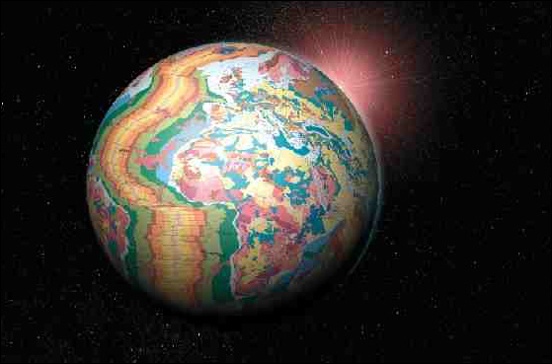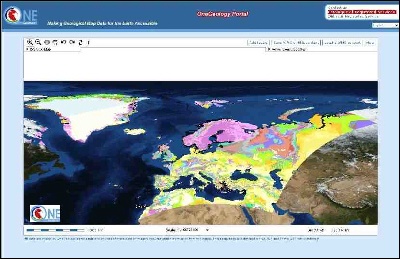OneGeology: New Map Strips Mother Earth Naked
Mother Earth naked -- a modern masterpiece
Have you ever wondered what our world would look like stripped bare of all plants, soils, water and man-made structures? Well wonder no longer; images of the Earth as never seen before have been unveiled in what is the world's biggest geological mapping project ever.

Earth and computer scientists from 79 nations are working together on a global project called OneGeology to produce the first digital geological map of the world. This project is doing the same for the rocks beneath our feet that Google does for maps of the Earth's surface. These scientists have achieved their goal in just over one year after initiating this global project. For a science that usually counts time in millions of years, this is no mean feat!
OneGeology is supported by UNESCO and six other international umbrella bodies and is the flagship project for UN International Year of Planet Earth 2008. The key results of this project are:
1. Geological maps from around the globe are accessible on the World Wide Web;
2. A new web language has been written for geology which allows nations to share data with each other and the public;
3. The know-how to do this is being exchanged so that all nations across the world, regardless of their development status, can take part and benefit.

Explaining the significance of this project, Ian Jackson, Chief of Operations at the British Geological Survey, who is coordinating OneGeology explained: "Geological maps are essential tools in finding natural resources e.g. water, hydrocarbons and minerals, and when planning to mitigate geohazards e.g. earthquakes, volcanoes and radon. Natural resources are a crucial source of wealth for all nations, especially those that need to develop and build their economies. Identifying geohazards is often a matter of life or death. Other challenges facing all nations in the 21st century include rising sea levels, management of waste (nuclear or domestic) and storage of carbon. Knowledge of the rocks that we all live on has become increasingly important and sharing that knowledge at a time of global environmental change is crucial".
François Robida, Deputy Head of Division, Information Systems and Technologies at the Bureau de Recherches Géologiques et Minières, France, explained; "Today you can go to the OneGeology website and get geological maps from across the globe -- from an overview of our entire planet, to larger scale maps of the rocks of individual nations. You also have the ability to hop from this web site to higher resolution applied maps and data on linked national web sites. Participating nations are contributing to a legacy for humankind; by acting locally they are thinking globally".
Unfortunately information about the Earth's rocks isn't always up-to-date, joined-up, and in some parts of the world is not available at all! This was the challenge that OneGeology project set out to tackle and these scientists will be unveiling the the result of their work at the 33rd International Geological Congress in Oslo, Norway on 6 August 2008.
NOTES
International organisations supporting OneGeology include:
1. UNESCO
2. International Union of Geological Sciences (IUGS)
3. International Consortium of Geological Surveys (ICOGS)
4. EuroGeoSurveys
5. Commission for the Geological Map of the World (CGMW)
6. International Steering Committee for Global Mapping (ISCGM)
7. International Lithosphere Program
OneGeology Project
The
OneGeology project was initiated in England in March 2007,
when leading scientists from more than 43 countries around
the world, from as far apart as Australia and Brazil, Canada
and Russia, Namibia and Japan met to agree and plan the
details of this global project. A movie capturing this event
may be seen at
http://www.onegeology.org/docs/brighton_workshop/onegeology.html
The
OneGeology project website is at
www.onegeology.org
International Year of Planet Earth 2008
The International Year of Planet Earth (IYPE) was proclaimed for 2008 by General Assembly of the United Nations in its Plenary Session on the 22 December 2005. The aim of the IYPE is to demonstrate new and exciting ways in which Earth sciences can help future challenges involved in ensuring a safer and more prosperous world. More about IYPE can be found at: www.esfs.org
The British Geological Survey
The British Geological Survey (BGS), a component body of the Natural Environment Research Council (NERC), is the nation's principal supplier of objective, impartial and up-to-date geological expertise and information for decision making for governmental, commercial and individual users. The BGS maintains and develops the nation's understanding of its geology to improve policy making, enhance national wealth and reduce risk. It also collaborates with the national and international scientific community in carrying out research in strategic areas, including energy and natural resources, our vulnerability to environmental change and hazards, and our general knowledge of the Earth system. More about the BGS can be found at http://www.bgs.ac.uk/
Dr. Marie
Cowan
BGS Communications Unit
W.
www.bgs.ac.uk
Source: British Geological Survey (UKL)
ENDS
Latest World News | Top World News | World Digest | Archives | RSS


 Palestine Forum of New Zealand: A Message To Pope Leo XIV
Palestine Forum of New Zealand: A Message To Pope Leo XIV Pacific Islands FFA: Ten Years Together - Celebrating Regional Solidarity Through The NTSA
Pacific Islands FFA: Ten Years Together - Celebrating Regional Solidarity Through The NTSA ITUC: The Greatest Threat To Democracy In 80 Years - Stop The Billionaire Coup
ITUC: The Greatest Threat To Democracy In 80 Years - Stop The Billionaire Coup Save The Children: A Third Of 5-Year-Olds Will Be Spared Unprecedented Lifetime Exposure To Dangerous Heat If World Meets 1.5°C Temperature
Save The Children: A Third Of 5-Year-Olds Will Be Spared Unprecedented Lifetime Exposure To Dangerous Heat If World Meets 1.5°C Temperature Access Now: NSO To Pay $168 Million In Damages To WhatsApp For Pegasus Spyware Hacking
Access Now: NSO To Pay $168 Million In Damages To WhatsApp For Pegasus Spyware Hacking NIWA: New Study Reveals Climate Change Is Already Impacting The Andes
NIWA: New Study Reveals Climate Change Is Already Impacting The Andes